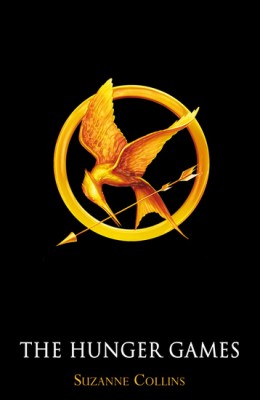 The Hunger Games by Suzanne Collins
The Hunger Games by Suzanne Collins
Three words: raw, unadulterated violence.
So the Hunger Games is based on the exploits of Katniss Everdeen, a sixteen-year-old living in a totalitarian society. At the beginning of the book there are twelve districts in which people live, these people resembling something similar to worker bees for the post-apocalyptic society named Panem. All twelve districts work to supply the Capitol with food, clothes, materials and so on in order for the inhabitants to live in luxury. The Capitol is a ridiculous and pompous sector of Panem where people think of nothing but comfort and looks, the majority of them appearing uneducated and consumed with remaining socially agreeable. The Capitol is led by President Snow, perhaps the Big Brother figure of the novel.
District Twelve is Katniss’ home district and, unsurprisingly, the poorest of all the districts. It’s a mining community and many of it’s citizens have been killed in a host of accidents, including the fathers of both Katniss and Gale (Katniss’ best friend and blatant desire of her loins).
Every year to commemorate the attempted uprising of District Thirteen (which was later destroyed), one girl and one boy from each of the districts is placed into a televised, complexly designed arena to fight to the death. The remaining child is hailed from then on as some sort of celebrity. Katniss’ little sister, Prim, is initially selected, but of course Katniss puts herself forward to take her place. This is one of the many predictable points of the novel but you do learn to ignore them and enjoy the book.
Peeta is the chosen boy as it would be far too obvious and dull for Collins to have chosen Gale. It turns out, however, that many years before when Katniss’ family were starving, Peeta secretly supplied them with a loaf of bread from his bakery and she has felt forever in his debt. And he, strangely, has always been desperately in love with her, a fact that he declares to the whole of the Capitol via television just before the Games begin. Again, ignore this particular obvious plot ‘twist’, it does get better.
Once at the arena, the novel is based entirely on Katniss’ view of the battle and her fight to stay alive. Who can she trust, if anyone? How will she force herself to kill?
What I loved about this book was that, even though it is labelled YA, it does not hold back. The idea behind the Games is not pleasant, and Collins describes it as such.
I doubt this is much of a spoiler, especially as I’m about to review the next two books, but both Katniss and Peeta survive the Games mostly by playing up to a ruse that they are in love, and are crowned the very first pair of winners ever to be had in Panem’s history. Is this a good thing or a bad thing? As you can probably gather from the plot being set in a totalitarian society, the reason why Katniss and Peeta are both allowed to leave the arena together is not necessarily seen in a positive way by President Snow. They have defied long-standing rules and something must occur to stop this happening again…
I got really into this book, I must say. The characters are well rounded and often act realistically, and although there are some parts that are a little predictable and a little too convenient in favour of the storyline, I was hooked. Katniss is a bit of a badass and I was genuinely rooting for her throughout the novel.
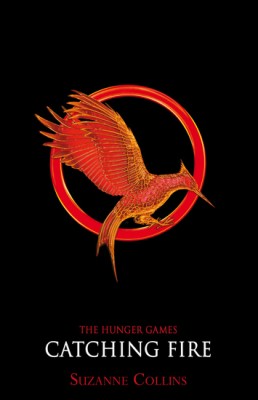 Catching Fire by Suzanne Collins
Catching Fire by Suzanne Collins
Catching Fire begins with preparations for Katniss and Peeta’s celebratory tour of the districts. They are wealthy, famous and have made their own district better off by winning, but both are plagued by nightmares from the Games and their relationship with one another is quite strained. Peeta is more into their fake relationship than Katniss is, and Katniss is confused by her feelings for both Peeta and Gale. She is also dreading the tour somewhat. Promoting an event where children have to kill one another doesn’t seem like fun times to me either.
And then it gets a little worse. President Snow mentions privately to Katniss that a small uprising had begun in one of the districts and it is her responsibility to ensure that no more are inspired by the tour – her speeches and public appearances are to remain positive for the good of Panem.
Well, that doesn’t quite pan out, and mutterings of disquiet in the districts begin to crop up all over the place. Peeta fake proposes to Katniss on live television, which helps things a little bit, but it is not quite enough to smooth things over.
To rid any chance of Katniss and Peeta inspiring a serious uprising, President Snow decides that for the ‘Third Quarter Quell’ (75th year of the Hunger Games) there should be two past victors of the Games chosen from each district, one male and one female, to re-enter the arena for a special edition of this bloodthirsty yearly ritual. Except for their mentor, Haymitch, Peeta and Katniss are the only victors of District Twelve (shockingly predictable). Put away those wedding catalogues, Kat, you’re probably not going to need them anymore.
Although it seems that Collins is setting things up for a revamp of the previous novel’s tried and tested formula, this isn’t exactly the case. The characters seem to have their own political and personal agendas, and the fight becomes more than that of mere survival. Katniss and Peeta gain allies during their training prior to the Games and, when they are in the arena, they make sure they stick with some of the other victors for protection. Each ally has an individual set of skills and relies on remembering previous Games to get by. There is a indication during the first three quarters of the novel that all of the older victors know something that Katniss doesn’t and, as they battle together, secret plans become unveiled on a scale much larger than Katniss could have ever anticipated. As the fighting reaches a crescendo, Katniss and some of her allies are plucked out of the Games by rebels fighting against President Snow in order to begin their fight against the Capitol. They are unable to get to Peeta however, and he is taken hostage.
Catching Fire is a lot maturer than the first novel of the trilogy and answers a great deal of burning questions. All of the characters are thinking before they’re acting and paranoia is an ongoing hurdle, which makes it really interesting to note individual reactions to certain events without knowing entirely what their agenda is. Like in the first Hunger Games, you are not entirely sure who can be trusted.
The character of Katniss has developed significantly and she is no longer just a pawn for the plot. However, the more realistic the character becomes, the more unlikeable she is. I was still rooting for her to survive but she became a tad irritating at times. The complicated love stuff with Peeta is good but is constantly thrown at the reader, and always seeing Katniss’ point of view on things can make her seem a little whiney. She does have many good reasons to whine, but nevertheless I often got quite sick of her.
Overall I thoroughly enjoyed this book, not as much as the first but it was still very impressive. It was subtle and individual character perspectives didn’t feel so black and white. The seamless way in which Collins increases the tension and the build-up to a full-on revolution filled me with envy as getting the pacing right in this sort of novel can be extremely difficult. There was a great sense of realism and unpredictability throughout, although there is the same old need for a cliffhanger at the end of every single chapter to contend with. The conclusion of the book was mildly annoying as it was yet another cliffhanger that posed more questions than it solved, but I suppose it did its job as I immediately picked up Mockingjay.
And the revolution begins.
Katniss and the victors that have been rescued from the arena and are transported to the underground city that District Thirteen has become since it’s initial destruction. The place is now a highly organised underground city and the inhabitants are definitely not in favour of the Capitol – a perfect place to organise an uprising.
Katniss agrees to become the Mockingjay, the figurehead of the rebels, and her aim is to persuade the rest of the districts to resist the control of President Snow. After a successful rescue attempt headed by Gale, a psychologically damaged Peeta is brought to District Thirteen. He has been brainwashed to detest Katniss and considers her a mortal threat. Katniss doesn’t seem to like this very much as she was starting to come round to the idea of getting it on with the (now slightly crazy) baker’s son. Ah well, there’s still Gale? Only…he seems a little less interested too. Damn.
The rest of the novel is dedicated to the Katniss-lead team of rebels infiltrating the Capitol in order to get to President Snow and to release the districts of their slave-like roles. One of the perks of being the Mockingjay is that Katniss is granted permission to execute the leader of Panem…but will she get to do it? Can she still trust those around her as she discovers more lies, more secrets and more hidden truths?
With it being a slower-paced novel with not nearly as much action or plot twists and turns (except for the ending), Mockingjay is a little difficult to get into at times.
Katniss is getting weaker – mentally and physically. It’s fascinating reading how her sanity is splintering after so much violence and stress.
The conclusive chapters of the trilogy are extremely riveting at times but, like the previous two books, fail to give a truly satisfactory ending. Not enough detail and time is given to the more interesting aspects of the revolution and, when it is all essentially over, Katniss decides to have no more to do with society and goes back to District Twelve to live out her days in near solitude. I’m glad she wasn’t made President of Panem as that would have been a very difficult idea to swallow, but the follow-up story of life after the rebel attack doesn’t reveal any real details about any of the other characters, which is extremely disappointing. Also, can you be the leader of a revolution and then completely cut yourself off from what you were fighting for?
But, as I have mentioned in a previous post (http://www.dystopic.co.uk/the-reluctant-leader-of-the-revolution), the Hunger Games is essentially a story about humans, not a sociology essay. I admire Collins work tremendously as she juggles realism and the unpredictability of human emotions while simultaneously producing something that has been easily transformed into a Hollywood blockbuster.
Conclusion
The Hunger Games universe is extensive, the characters are intriguing and the plot is so compelling that I would utter the cliche “I just simply couldn’t put it down”. There are a few irritations that were to be expected from a YA book, but the themes are very adult and thought-provoking.
I also cried at the end. There, I said it.
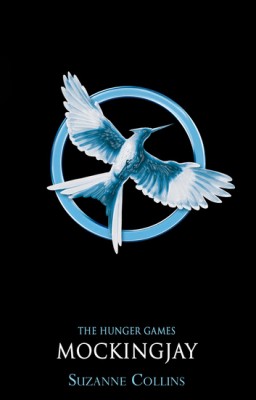
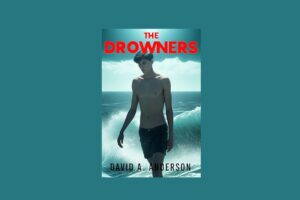
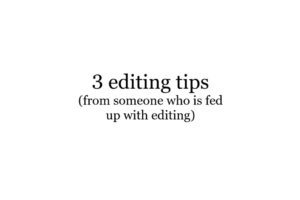

Leave a Reply